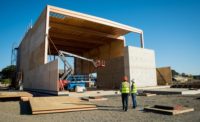Legislation
Groups Oppose Bill Set to Favor Mass Timber for Federal Buildings

Opponents of bill pushing for mass timber use in federal construction say it would disrupt the competitive bidding process.
Photo by Sarah Worth on Unsplash
The American Institute of Steel Construction, the American Iron and Steel Institute and the Steel Manufacturers Association have sent a joint letter to Congressional leaders opposing the proposed Mass Timber Federal Buildings Act because it favors the award of federal and military contracts to teams that use timber as a structural building material.
The May 17 letter, addressed to Rep. Rick Crawford (R-Ark.), chairman of the Congressional Steel Caucus and its vice chairman, Rep. Frank J. Mrvan (D-Ind.), says the bill “disrupts the competitive bidding process” and could strain the supply chain should wood demand rise.
"While we support the exploration and development of innovative building materials, this bill, and similar efforts, created an unfair contracting preference and would ultimately hinder rather than promote responsible construction practices," the groups state.
“There are still serious questions about mass timber's performance—and impulsive mandates, subsidies and legislation pushing mass timber will almost certainly increase project costs, constrain our country’s visionary architects and limit an engineering professional's ability to choose the appropriate construction material for a given project,” says Brian Raff, vice president, sustainability & government relations, for the steel construction group.
“Those decisions should be left to a building’s owner and the team designing and building it," he adds. "The government shouldn’t be in the business of mandating things like that.”
At least one concrete group also opposes the bill. “We believe it is a bad bill that seeks to put concrete, steel and other building materials and systems at a disadvantage to mass timber,” says Lionel Lemay, executive vice president, structures and sustainability, for the National Ready Mixed Concrete Association. “Federal construction policy should set forward standards and guidelines and not pick winners and losers in the construction materials space.”
Proposed on April 17 by senators Jeff Merkley (D-Ore.) and James Risch (R-Idaho), the act (S4149) is intended to create jobs in rural and urban areas.
Wood interests support the bill. “Mass timber sourced and made in the U.S. is a right now solution for resilient, carbon-friendly and sustainable buildings," says Jackson Morrill, president & CEO of the American Wood Council.
Currently, mass timber is not a consideration for federal contracting requirements, he adds.
"This bill doesn’t mandate anything but does ensure that mass timber must at least be considered for a relevant federal project,” he says. “Sustainability and transparency are essential components of the federal construction process, and the wood products industry is ready to meet the market demands for transparency with data-based life-cycle assessments and certified environmental product declarations.”


